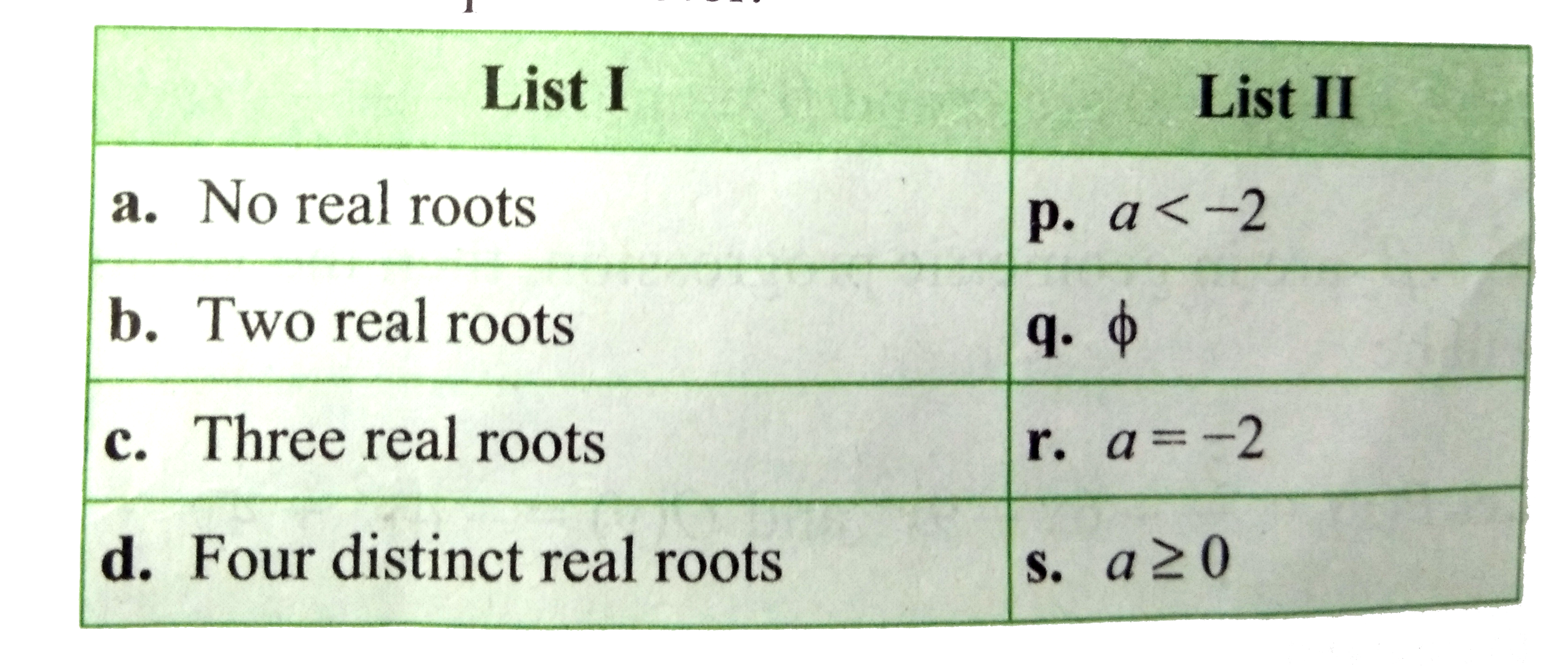Consider the equation x4+2ax3+x2+2ax+1=0, where a∈R.
If exactly two roots are positive and two roots are negative, then the number of intergal values of a is Solution in Bengali
(3/4,∞)
(−5/4,∞)
(−∞,1/4)
none of these
The correct Answer is:1
Given equations is
x4+2ax3+x2+2ax+1=0
or (x+1x2)+2a(x+1x)+1=0
or (x+1x)2+2a(x+1x)−1=0
⇒t2+2at−1=0
Where t=x+(1/x). Now,
(x+1x)2≥2or(x+1x)≤−2
∴t≥2ort≤−2
Now, Eq.(1) will have at least two roots negative, when at least one roots of Eq.(2) will be less than −2. If α,β≥−2,then
f(−2)≥0and−B2A>−2
∴4−4a−1≥0and−2a2>−2
∴a≤34and<2
∴a≤34
Combining (3) and (5), at lest one roots will be less than −2 for Eq.(2) if
a>34
therforea∈(34,∞)
Topper's Solved these Questions
- THEORY OF EQUATIONSBOOK - CENGAGE PUBLICATIONCHAPTER - THEORY OF EQUATIONSEXERCISE - MATRIX MATCH TYPE
6 Videos
- THEORY OF EQUATIONSBOOK - CENGAGE PUBLICATIONCHAPTER - THEORY OF EQUATIONSEXERCISE - NUMERICAL VALUE TYPE
43 Videos
- THEORY OF EQUATIONSBOOK - CENGAGE PUBLICATIONCHAPTER - THEORY OF EQUATIONSEXERCISE - Multiple Correct Answer Type
38 Videos
- STRAIGHT LINESBOOK - CENGAGE PUBLICATIONCHAPTER - STRAIGHT LINESEXERCISE - ARCHIVES (NUMERICAL VALUE TYPE)
1 Videos
- THREE DIMENSIONAL GEOMETRYBOOK - CENGAGE PUBLICATIONCHAPTER - THREE DIMENSIONAL GEOMETRYEXERCISE - All Questions
291 Videos
Similar Questions
Match the following for the equation x2+a|x|+1=0 where, a is a parameter.

View SolutionIf x=2+22/3+21/3 , then the value of x3−6x2+6x is
View SolutionIf c≠0 and the equation p2x=ax+c+bx−c has two equal roots, then p can be
View SolutionFor a point P in the plane, let d1(P)andd2(P) be the distances of the point P from the lines x−y=0andx+y=0 respectively. The area of the region R consisting of all points P lying in the first quadrant of the plane and satisfying 2≤d1(P)+d2(P)≤4, is
View SolutionFind the angle between the line whose direction cosines are given by l+m+n=0andl2+m2−n2=0.
View SolutionFind all the values of 'a',so that exactly one root of the equation x^(2)-2ax+a^(2)-1=0 lies between the numbers 2 and 4, and no root of the equation is either equal to 2 or equal to 4.
View SolutionIf A.M of the roots of x^(2)-2ax+b^(2)=0 is equal to the ......... of the roots of the equation x^(2)-2bx+a^(2)=0
View SolutionConsider the equation x^(4)+2ax^(3)+x^(2)+2ax+1=0 where a in R Also range of function f(x)=x+(1)/(x) is (-oo,-2]uu[2,oo) If equation has at least two distinct positive real roots then all possible values of a are
View SolutionIf one root of the equation x^(2)+Ax+12=0 is 4 and the roots of x^(2)+2Ax+B=0 are equal,then N value of B is
View SolutionThe abscissa of two points A and B are the roots of the equation x2+2ax−b2=0 and ordinates are the roots of equation x2+2ax−b2=0. Find the equation of the circle whose diameter is AB.
View SolutionIf the roots of the equation 2ax3+(3b−9)x+1=0 are −2 and 3, then the value of a and b respec-tively are
View SolutionThe set of values of 'a' for which the roots of the equation (a−3)x2−2ax+5a=0 are positive, is
View SolutionFor what values of the parameter a the equation x4+2ax3+x2+2ax+1=0 has atleast two distinct negative roots?
View SolutionNumber of integral values of 'a' for which (a-5)x^2 - 2ax + (a-4)=0 , has exactly one root in(0, 2), is
View SolutionThe equation x4+2ax3+x3+2ax+1=0 has at least two distinct negative roots is
View SolutionIf the equation x2−2ax+a2+a−3=0 has exactly one real root in (1,3) then largest integral value of a is
View Solution
